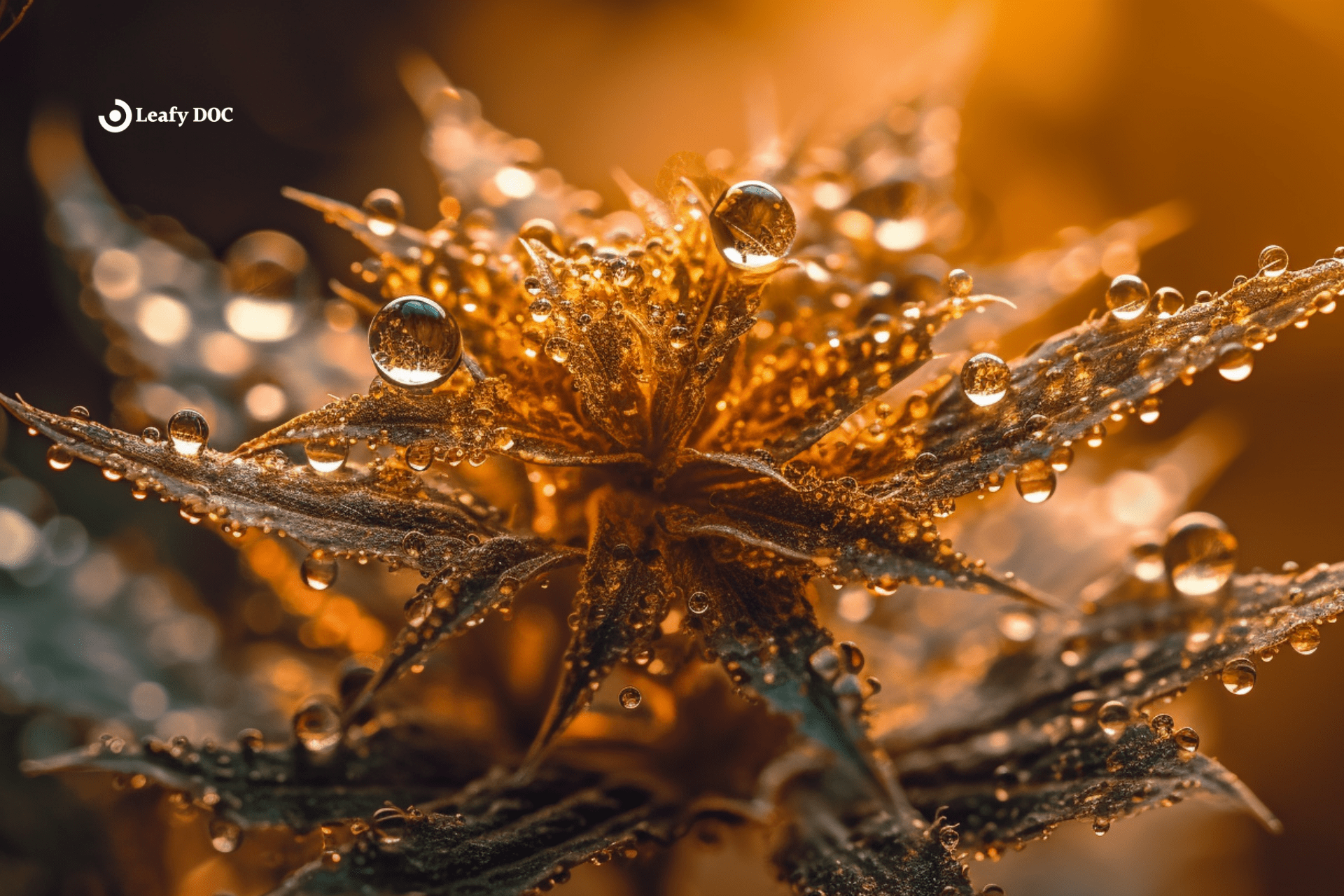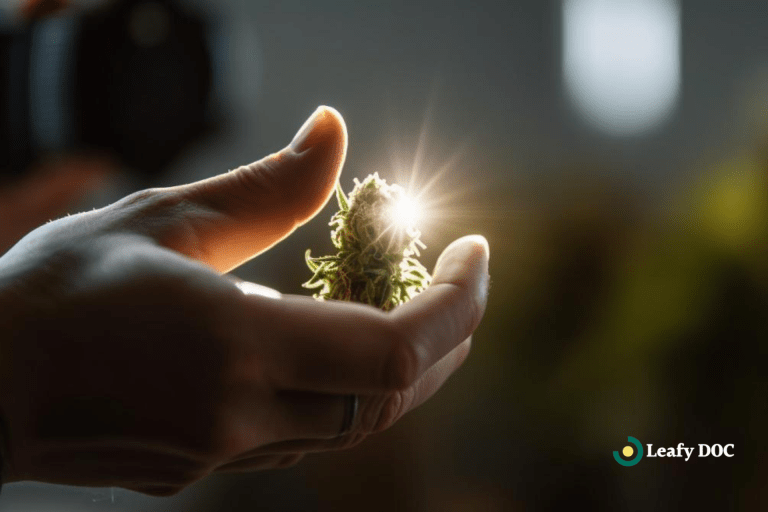What Is 11 Hydroxy Thc ?
by Haley Mills · October 18, 2023
Unveiling the Power of 11 Hydroxy THC: Dive into the mind-bending effects of this potent marijuana metabolite. Learn more about 11 hydroxy thc and its secrets now! Click here for an eye-opening article that will blow your mind.

11-Hydroxy THC is a chemical compound that is derived from tetrahydrocannabinol (THC), the main psychoactive component of cannabis. It is formed in the body when the liver metabolizes THC. This compound has gained significant attention in recent years due to its potential medical applications and its role in the effects of cannabis consumption.
In terms of its chemical composition, 11-Hydroxy THC is a hydroxylated version of THC. This means that it contains an additional hydroxyl group (-OH) attached to the THC molecule. This modification alters the structure and properties of the compound, leading to different effects on the body compared to THC alone.
Understanding the specific effects and mechanisms of action of 11-Hydroxy THC is crucial for comprehending the overall impact of cannabis consumption on the body and mind.
The Chemical Composition of 11-Hydroxy THC
Now that you understand the basics of THC, let’s dive into the fascinating world of 11-hydroxy THC and its chemical composition.
11-hydroxy THC is a metabolite of delta-9-tetrahydrocannabinol (THC) that is formed in the liver after THC is ingested. It is produced through the process of oxidation, where THC is broken down into 11-hydroxy THC by enzymes in the liver. This metabolite is known to have different pharmacological effects compared to THC.
One of the key differences between THC and 11-hydroxy THC is their ability to cross the blood-brain barrier. THC can pass through this barrier easily and bind to cannabinoid receptors in the brain, leading to its psychoactive effects. On the other hand, 11-hydroxy THC is thought to have a higher affinity for these receptors, meaning it binds more strongly to them and may have stronger pharmacological effects. This could explain why some individuals experience a more potent and longer-lasting high when consuming edibles or other forms of THC that are metabolized into 11-hydroxy THC.
The differences in pharmacological effects between THC and 11-hydroxy THC may also be due to their different chemical structures. While THC has a cyclic ring structure, 11-hydroxy THC has an additional hydroxyl group attached to it. This slight modification can alter the way the molecule interacts with receptors in the body, potentially leading to different effects.
How Does 11-Hydroxy THC Affect the Body?
When you consume 11-hydroxy THC, it quickly travels through your bloodstream and interacts with receptors in your brain and body, leading to various effects.
This compound is formed when THC, the psychoactive component of cannabis, is metabolized by the liver. Once it enters the bloodstream, 11-hydroxy THC binds to cannabinoid receptors in the brain, specifically the CB1 receptors, responsible for THC’s psychoactive effects.
The psychoactive effects of 11-hydroxy THC on the mind can be quite potent. The compound is known to produce a more intense and long-lasting high compared to THC itself. This is because 11-hydroxy THC can more easily cross the blood-brain barrier and bind to CB1 receptors, resulting in a stronger effect on the mind.
Additionally, the effects of 11-hydroxy THC can last significantly longer than those of THC. While the effects of THC typically last for a few hours, the effects of 11-hydroxy THC can last for up to 8-12 hours.
These prolonged and intensified effects of 11-hydroxy THC can lead to a range of experiences, including increased euphoria and relaxation, enhanced sensory perception, heightened creativity and introspection, and possible feelings of anxiety or paranoia in some individuals.
The Metabolism and Conversion of THC into 11-Hydroxy THC
As you indulge in THC, your body undergoes a fascinating transformation, converting it into a compound known as 11-hydroxy THC. The metabolism and conversion of THC into 11-hydroxy THC is a complex process influenced by various factors.
The pharmacokinetics of 11-hydroxy THC refers to how the body absorbs, distributes, metabolizes, and eliminates compounds. Once THC is ingested or inhaled, it’s rapidly absorbed into the bloodstream and carried to the liver, where it undergoes a process called first-pass metabolism. In the liver, THC is metabolized by enzymes, primarily cytochrome P450, into various metabolites, including 11-hydroxy THC.
Several factors influence the conversion of THC into 11-hydroxy THC. One factor is the route of administration. When THC is ingested, such as in the form of edibles, it undergoes a more extensive conversion into 11-hydroxy THC than inhalation. This is because THC that’s ingested is first absorbed by the gastrointestinal tract and then metabolized by the liver, whereas inhalation delivers THC directly to the bloodstream, bypassing the liver to some extent.
Individual differences in metabolism can also affect the conversion of THC into 11-hydroxy THC. Some individuals may have variations in the enzymes responsible for metabolizing THC, leading to differences in the rate and extent of conversion. Factors such as genetics, age, and overall liver function can influence these individual differences.
Potential Medical Applications of 11-Hydroxy THC
11-Hydroxy THC has shown potential in various medical applications. Studies have indicated that this metabolite of THC has therapeutic effects that could be beneficial in treating certain medical conditions.
One of the potential therapeutic effects of 11-Hydroxy THC is its analgesic properties. It has been found to have a stronger analgesic effect than THC, making it a promising option for pain management. 11-Hydroxy THC has been shown to have anti-inflammatory properties, which could make it useful in the treatment of inflammatory conditions such as arthritis.
In terms of dosage and administration, the optimal dose of 11-Hydroxy THC for medical use has not yet been established. However, it’s important to note that the effects of 11-Hydroxy THC are more potent and longer-lasting compared to THC. Therefore, it’s recommended to start with a low dose and gradually increase as needed, under the supervision of a healthcare professional.
The route of administration can also affect the onset and duration of effects. For example, oral administration of 11-Hydroxy THC may result in a slower onset of action compared to inhalation.
The Legal Status of 11-Hydroxy THC
Here are a few key points regarding the legal status of 11-Hydroxy THC:
- In countries where recreational use of THC is legal, 11-Hydroxy THC is often included in the regulations. This means that individuals can legally consume products containing this compound for recreational purposes.
- However, in countries where recreational use of THC is illegal, 11-Hydroxy THC is also considered illegal. This is because 11-Hydroxy THC is a metabolite of THC, and its psychoactive effects are similar to those of THC.
- The legal status of 11-Hydroxy THC can also impact drug testing accuracy. Drug tests typically detect the presence of THC, but they may not specifically test for 11-Hydroxy THC. This means that individuals who’ve consumed products containing 11-Hydroxy THC may test positive for THC on a drug test, even if they haven’t recently consumed THC itself.
In Conclusion
11-hydroxy THC is a chemical compound that is formed in the body after the consumption of THC. It is a metabolite of THC and is known to have a more substantial psychoactive effect on the body.
This compound is believed to be responsible for many of the effects experienced when consuming THC, such as euphoria and relaxation. The metabolism and conversion of THC into 11-hydroxy THC occurs in the liver, where THC is broken down into its metabolites.
There is ongoing research into the potential medical applications of 11-hydroxy THC. Some studies suggest it may have therapeutic potential for pain, nausea, and inflammation. However, more research is needed to fully understand the potential benefits and risks of using this compound for medical purposes.
From a legal standpoint, 11-hydroxy THC is considered a controlled substance in many countries. Understanding the chemical composition and effects of 11-hydroxy THC can provide valuable insights into THC consumption’s pharmacology and legal implications.
Last Updated: August 8, 2024
Get Approved for Your Medical Marijuana Card in Minutes!

Get Your Medical Card
Connect with a licensed physician online in minutes

Like This Article?
Share with your friends
Table of Contents
Keep Reading
-
Is Medical Marijuana Legal in Mississippi? A Step-by-Step Guide
Discover the legality of medical marijuana in Mississippi with our comprehensive guide.
-
Elevate Your Culinary Creations with Cannabutter: A Gourmet Guide
Take your steak to new heights by infusing it with the rich flavors of Cannabutter. Learn how to elevate your cooking game and create a culinary masterpiece today! Click here for the ultimate recipe guide.
-
Understanding Cannabis Dosing Guidelines: Finding The Right Amount
Uncover the secrets to perfect cannabis dosing with our comprehensive guide on understanding cannabis dosing guidelines. Find your ideal dose and enhance your experience today!



